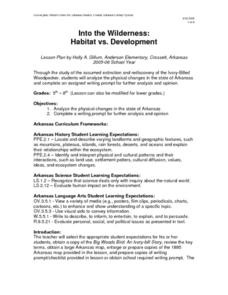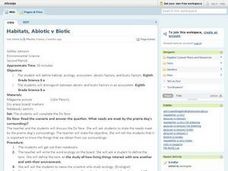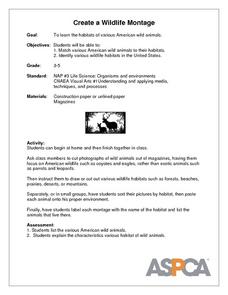Curated OER
Into the Wilderness: Habitat vs. Development
By studying the once-assumed extinction, then rediscovery of the Ivory-Billed Woodpecker, learners look at the physical changes that have occured in habitats throughout Arkansas. This outstanding lesson is chock full of terrific...
Curated OER
Habitats: Oceans & Deserts
Students perform a variety of lessons to explore deserts and oceans.
Curated OER
Habitats
Students examine how different living things interact with their environment. As a class, they discuss the characteristics of a habitat and write the list on the board. In groups, they focus on one habitat and create a mural of the...
Curated OER
Habitats: must live with them....cannot live without them.
Students conduct an internet study regarding habitat, ecosystem, biome and the region they live in. They observe the habitat by visiting a State Park and observing the organisms in their habitat. In addition, they create their own...
Curated OER
Habitats Activity
In this habitat worksheet, learners identify and sort the animals in a box of animal crackers to the habitats to which they belong and then create a graph to document how many animals fit into each habitat.
Curated OER
Habitats, Abiotic v. Biotic
Students explore and define ecosystem, ecology and habitat. They discuss abiotic and biotic organisms and the things needed for survival. After observing pictures of animals in their habitat, students compare and contrast habitats and...
Scholastic
Study Jams! Biomes
Do you know the difference between a biome and an ecosystem? Teach elementary ecologists exactly what a biome is with this captivating cartoon! It discusses six biomes: taiga, tundra, deciduous forest, desert, tropical rainforest, and...
Curated OER
Force of Habitat
Students examine the Nevada state quarter and discuss the Great Basin and the desert habitat. They draw a desert animal and write a sentence about its attributes and how they help the animal to survive in its habitat.
Curated OER
Land Environments
In this land environments worksheet, students will complete a table by filling in the climate, dominant plants, and characteristic animals for 6 different habitats.
Curated OER
Where Do They Live?
In this animal habitat worksheet, young scholars color a picture of 3 habitats. They then cut and color 12 animal pictures. Students paste the animals in the spaces, according to where they live.
Curated OER
Don't Call Me A Pig
First graders explore wildlife and habitats in the Arizona desert. Throughout a classroom discussion, 1st graders observe pictures of the desert and animals that live there. As they go on a nature walk around the school, students...
Curated OER
Desert Tortoise Adaptations
Students observe the Desert Tortoise in its natural surroundings. For this adaptations lesson, students study and take pictures of an animal in its habitat, then design a PowerPoint which addresses adaptations, biodiversity, and threats...
Curated OER
Habitats of the World
Students complete a unit of eighteen lessons that cover climate, geography, location, plants, and animals of each of the five habitats. They are also introduced to habitat destruction and discuss ways to protect the environment. They do...
Curated OER
Desert
Students explore desert landscapes and the animals that inhabit the desert. They discuss deserts and the animals that live there. Students compose a story using the correct sequence and illustrate the story with items they would find in...
Curated OER
Animal Habitats
In this habitat worksheet, 3rd graders will focus on the four different habitats of plants and animals. Students will receive color photographs of the rainforest, desert, coral reef, and grasslands.
National Wildlife Federation
What's Your Habitat?
How are third graders like rabbits? They both live in habitats and require food, water, and shelter to survive! An educational science lesson encourages your learners to think about their own habitats and survival needs, before comparing...
Curated OER
Endangered Species in the Sonoran Desert
Students identify and explain some caused of endangerment and extinction for species as well as explain the effects of extinction on an ecosystem. Teachers use this lesson plan before teaching students about collecting insects or plants.
Project WET Foundation
Investigate Fresh Water
It's all about freshwater in this water interactive! Users navigate through freshwater habitats such as lakes, rivers, and wetlands, taking note of the animals that live there. They also look at a desert habitat for comparison. Learners...
Curated OER
Animals and their Habitats
This animal habitat PowerPoint provides beautiful photographs of a rainforest, desert, and grassland habitat, as well as animals native to a rainforest and the desert. The first slide lists rainforest, desert, tundra, and grassland as...
Curated OER
Whose Home Is This?
After reading a short and informative paragraph on animals and their environments, learners look at pictures of four animals, and write a short description of how each one has adapted to its environment. A suggested activity is that each...
National Wildlife Federation
Pollinator's Journey: Grades K-4
What's it like to migrate as a pollinator? Teachers provide direct instruction about the roles of pollinators such as butterflies on plants along with the threats they encounter. The class then acts out a story of the migration of bats...
Curated OER
Create a Wildlife Montage
Students find and cut out pictures of American wildlife animals and draw separate American wildlife habitats. They sort their pictures by habitat and then glue each animal onto the correct habitat. They label each picture with the name...
Curated OER
Adaptations
Cacti have special adaptations for living in desert heat and dryness. Polar bears have adaptations that allow them to withstand icy conditions. Humans adapt to different conditions by wearing appropriate clothing or building homes...
Curated OER
Habitats Pictures: Farm, Forest, Wetlands, Polar
In this science worksheet, students examine color pictures of 4 different habitats: farm, forest, wetlands and polar. There are no questions to answer.

























